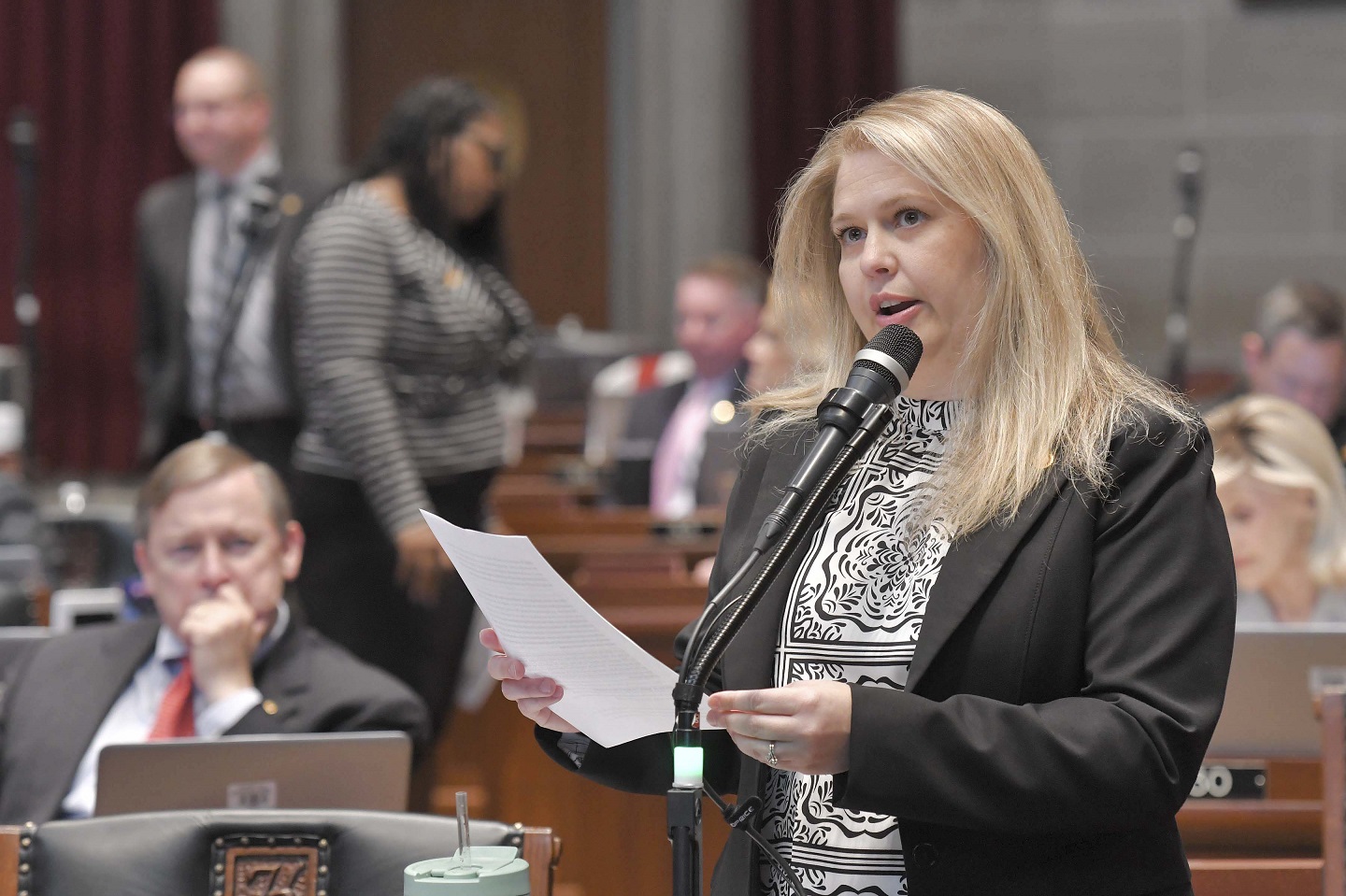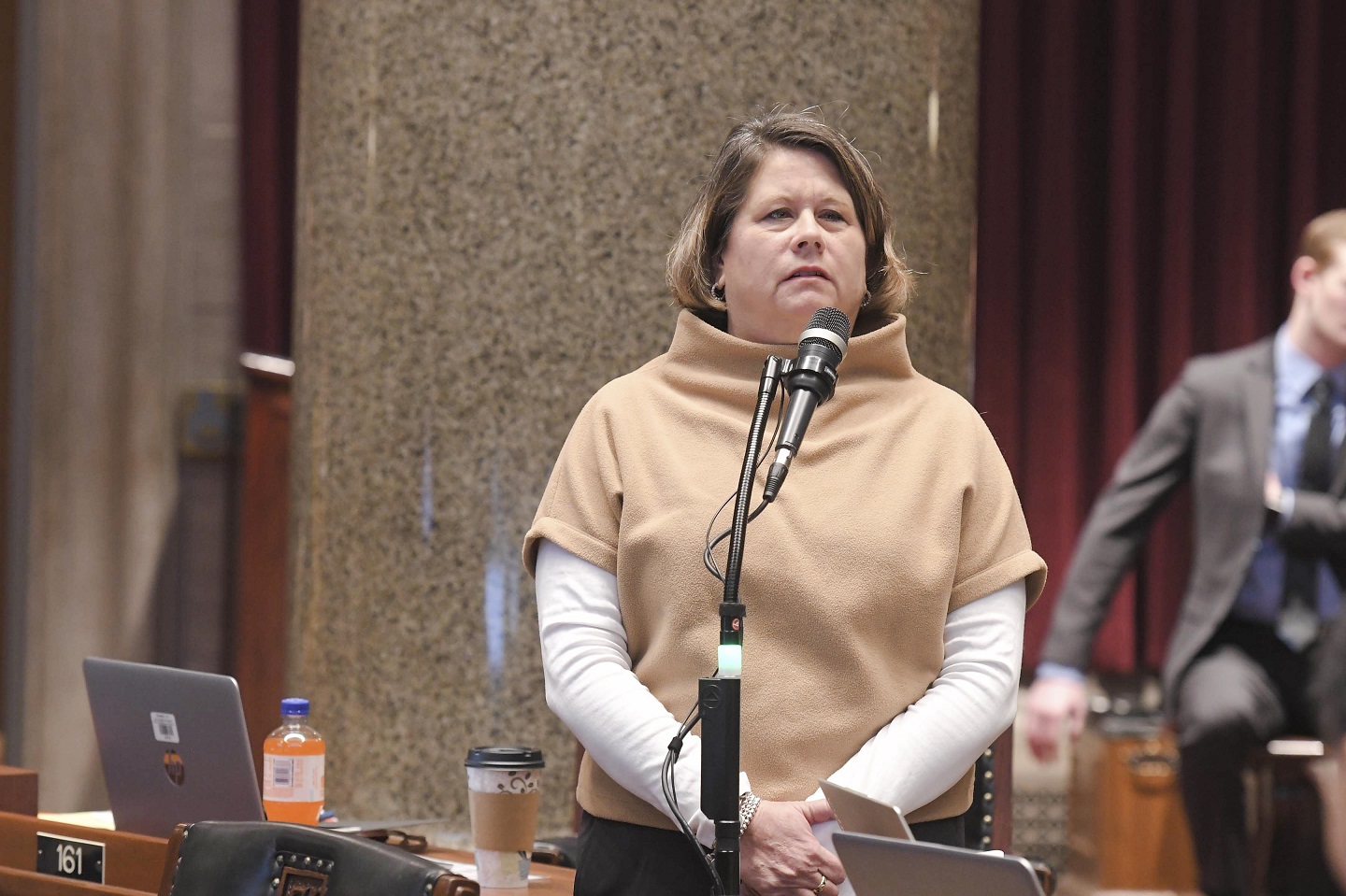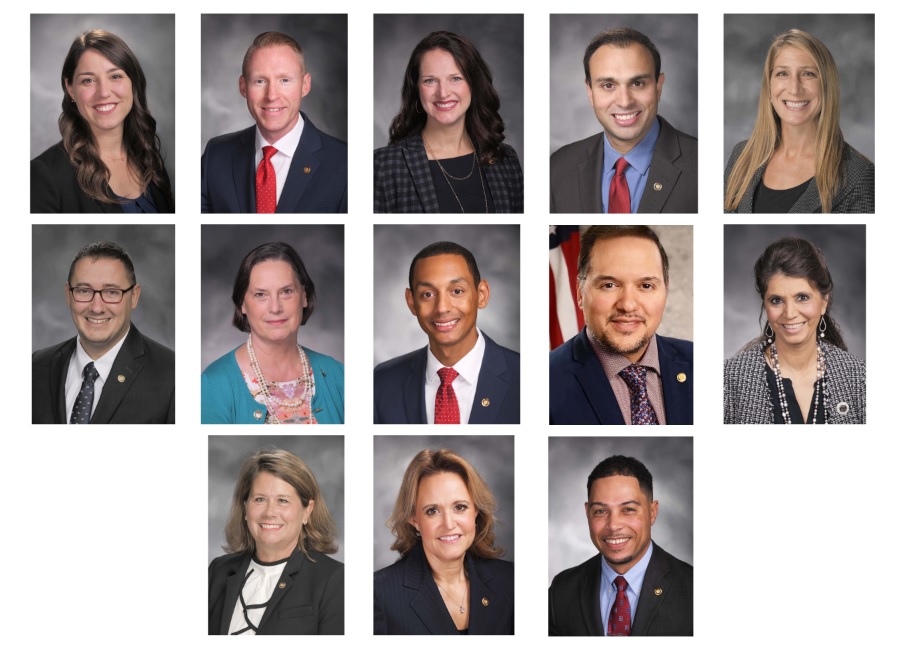The House Intersectional Equality Conference addressed reporters and took questions.
Tag: Jo Doll
House Approves Plan to Reduce Wait Times, Costs for Healthcare
House lawmakers have voted to decrease the time Missourians must wait for some medical procedures, increase quality of and access to healthcare, and decrease costs.
Insurance entities require health care providers to seek prior authorization before performing some procedures before they will agree to cover those procedures. If House Bill 1976 becomes law, health care providers who reach a 90 percent approval rate for a given procedure over a six month period will then not have to seek prior authorization for the following six months.

“Insurance companies and their prior authorization standards are getting in the way of health care for everyday Missourians,” said bill sponsor Melanie Stinnett (R-Springfield).
She said the passage of HB 1976 would mean “better access to care for patients and, potentially, decreased cost for patients, because the prior authorization process, itself, increases costs within the healthcare system.”
Stinnett said without knowing it, many patients have likely had a negative experience that involved prior authorization.
“Often, [patients] feel like it is something that the doctor hasn’t done or needs to do, but in reality it’s something that the health insurers lay over on top of what the health care provider has to do,” said Stinnett. “It’s a challenge that the health care provider has to deal with, but often the patient doesn’t realize who’s imposing it or where that’s coming from.”
“As someone who has spent hours and hours and hours trying to get preauthorization for patients that need physical therapy, I cannot support this enough,” St. Louis Representative Jo Doll (D), who has worked as a physical therapist, told her colleagues. “The process is burdensome, it takes hours and hours of – people that are there to provide patient care – takes them away from patients and makes them calling, writing, submitting countless forms to get visits approved.”

Health care industry workers and those patients who know of the prior authorization process view it as little more than “red tape” that drives up costs and slows care, and Representative Patty Lewis (D-Kansas City) agrees, and said some doctors report that the delays it causes lead to worse outcomes and even deaths.
The legislation made its way to the House after being approved by the Committee on Healthcare Reform. Chairman Kent Haden (R-Mexico) noted that panel gave it a bipartisan, unanimous vote.
“The only people that testified against it were the insurance people and [pharmacy benefit managers],” Haden said. “It is really good for all of our clients, all of our constituents. Not many bills we see effect everybody in the House and all their constituents. This bill will effect virtually everyone and their constituents immediately. It’s a great bill.”
Stinnett told her fellows the prior authorization process gives power to insurance companies and leaves providers fighting to get the best care and outcomes for their patients. Her legislation aims to change that, and to allow providers to focus more on patients’ needs rather than what insurers will allow.
The House voted 146-6 to send that legislation to the Senate.
Bipartisan Array of Bills from 13 House Members would Cut Taxes on Food, Diapers, or Feminine Hygiene Products
Many House lawmakers think Missourians need a break in the taxes they pay to the state. Thirteen House members, nearly evenly split across party lines, have proposed doing so by cutting taxes on necessary products, particularly diapers, feminine hygiene products, and food.
As the legislature enters the final few weeks of its session those bill sponsors are hoping their proposals will get some traction, perhaps as amendments to other proposals, or at least legislative hearings that could spur movement in future years.

None of these proposals have been referred to committees.
Missouri is one of only 13 states in the nation that taxes food. Three neighboring states do not tax food, and Kansas will join that number next year. St. Charles Republican Adam Schnelting is one of the legislators proposing that Missouri do the same.
Schnelting said as inflation has skyrocketed in recent years, he has hoped that his idea would catch on amount his House colleagues.
“My own family, my daughter is 6 years old, my son is 18 months old, we have a growing family and we feel it in our own pocketbook. I know I’ve got a lot of constituents and a lot of people back home that feel it in their pocketbook. If people in my district have to live within their means then so does the government,” Schnelting said. “My wife and I were spending almost $1,000 a month on food … every little bit helps and adds up. If you’re talking several hundred dollars that can go toward over things, like diapers.”
Lone Jack Republican Chris Sander said in districts such as his, which is near the border with Kansas, Missourians are taking advantage of the lower rates some neighboring states offer.
Robert Sauls (D-Independence) proposes exempting food not only from the state sales tax of 1.225 percent, but also from local sales and use taxes, which in some parts of the state drive the rate up to more than eight percent.
Representative Chris Dinkins (R-Lesterville) said she and other legislators are seeing more and more of their constituents struggling, and they want to help.
“I think we’re always looking at ways to help the citizens of Missouri,” Dinkins said. “When you look at people’s income status, you find that your lowest income people spend the largest percentage of their income on food, so they are the ones that’s most impacted by the sales tax. They spend around 30 percent or more of their income on food, whereas your middle income people only spend a little over 10 percent, so we’re impacting the people that need it the most, and we’re trying to help those that need it the most.”
Missouri taxes diapers and feminine hygiene products at 4.225 percent. Several neighboring states tax those products at a greater rate, but three don’t tax feminine hygiene products at all and one does not tax diapers.
The 4.225 percent rate is often called a “luxury” tax, as it is applied to items that are deemed non-essential. That doesn’t sit well with many lawmakers, including Representative Mark Sharp (D-Kansas City, who proposes taxing such items at the lesser 1.225 percent.
“They should not be taxed at a luxury rate … so reducing them down to a food sales tax, I believe, is the very least that we can do,” said Sharp. “Many states have gone as far as just removing the tax altogether, so we have to something to at least move the needle.”
Others, like Republican Wendy Hausman (St. Peters) want to take the extra step of eliminating the state sales tax on those items, altogether.
Hausman, who is in her second year as a freshman legislator, said the idea was brought to her by fellow members of a businesswomen’s group, Little Black Book.
“We want to make sure that we’re supporting Missouri families by making it easier for them, especially in a day and age where they try to tax you and gouge you everywhere. We need to figure out ways to try to give people and families relief,” said Lake St. Louis Republican Representative Justin Hicks. “We all know that females need feminine hygiene products, that’s a given, and with people having kids out there we all know that diapers are usually a major expense to a family.”
Many legislators and advocates point out that difficulty affording or providing necessary products has a ripple effect, contributing to issues with both mental and physical health.
“From a parent’s perspective, not being able to provide an essential item for their baby [such as diapers] has a mental toll, so it impacts their mental aspect. Also [as] a workforce issue, on average, parents in diaper need miss 5.1 days of work a month because they can’t afford diapers to send to child care with their child, so this is a workforce issue,” said Representative Patty Lewis (D-Kansas City). “Then not to forget the physical health aspect that it has on a baby, sitting in saturated diapers hours after hours. From UTIs to diaper rash, sometimes if they’re not cured with over-the-counter medicine they have to go to the physician or the pediatrician, so additional time off work for the parents and additional cost for the parents as well, and then there can be long-term effects, from renal failure or renal insufficiency, for these babies.”
St. Louis Democrat Barbara Phifer points out, “Period products, especially, are very intimate and personal. If you think about young girls who are going through puberty, and if they don’t have access to those products, their school participation drops dramatically.”
Opposition to these ideas in past years has come from local governments, who say cutting taxes on these products jeopardizes services they provide, such as emergency responders.
“I think that kind of deterred it,” said St. Louis Democrat Jo Doll. “Hopefully this year we can finally get [the tax cut on diapers and feminine hygiene products] across the finish line. I think the biggest problem is that it always gets attached to something and whatever it’s attached to falls apart.”
House Democrat leader Crystal Quade’s (Springfield) plan to cut taxes on food would let Missourians vote on a number of tax changes, including a tax on private planes and yachts, and create a fund in the state’s coffers to help local governments transition.
“Missourians are suffering right now when it comes to making ends meet, and it’s our job to come up with solutions that help everyone,” Quade said. “It’s up to us to figure out ways to make up those losses and that shouldn’t be a burden on the regular taxpayer.”
Representative Maggie Nurrenbern (D-Kansas City), who is in her fourth year on the House Budget Committee, said the state can afford to reduce these taxes.
“We’re looking at record budgets and we have a record surplus still in the state treasury. What can we actually do to pass on cost savings to working families?” said Nurrenbern. “I hate to see a mom standing in the line making that decision, ‘Do I buy this pack of diapers or that gallon of milk,’ and those are the decisions our families are faced with every single day, and it’s time now, to pass that savings on to families and cut the state portion of sales tax on essential items.”
Chesterfield Republican Ben Keathley said the growth in support for these proposed sales tax cuts is a direct response to inflation hikes over the past several years.
While 13 legislators contributed to this article, Keathley said more will get on board the longer such ideas are not passed.
House members push for lesser tax on feminine hygiene products, diapers
Nine bills filed in the Missouri House would reduce or eliminate the taxes paid on diapers, and most of those would also apply to feminine hygiene products. The bipartisan group of legislators backing them say such a change would help some among the Missourians who most need relief, especially during this period of increased inflation.

The rate at which these products are taxed is sometimes referred to as a “luxury tax.” That is the rate at which most products in Missouri are taxed. Food is taxed at a decreased rate, and some of the proposals would set the levy on those products to that rate. Others would make them exempt from the sales tax altogether.
Several of the bills’ sponsors said there is no reason to keep taxing these things at the greater rate.
“It’s ludicrous … these are not luxury items. These are items that you need to exist and function in society, period,” said Kansas City Democrat Maggie Nurrenbern.
Similar bills have been offered for several years but have fallen short of becoming law. Among their most fervent and consistent backers have been diaper banks. Data released last year by the National Diaper Bank Network placed the annual cost of diapers at nearly $1,000 per infant.
“Over time for the average family, the average parent that’s buying diapers for their child over the course of the first three or four years that will add up,” said Representative Mark Sharp (D-Kansas City) of the tax on those diaper purchases. “The least we can do at the state level is make sure that we’re taking care of the average person, the everyday person who’s just trying to make it and make sure that their child has adequate diapers [and we should] make sure that our older folks have the stuff they need as well.”

Republican Phil Christofanelli (R-St. Peters), sponsoring the proposal for the second straight year, said he thinks part of what has held it up in the past has been that it would significantly reduce revenue, particularly for local governments, “But I think this one’s important, particularly in our time of inflation, where the basic necessities for so many working families are incredibly high and we want to be a culture that encourages stable families and child rearing and a vibrant family culture and this is part of that, make sure that families can afford the necessities of raising kids.”
Representative Peter Merideth (D-St. Louis) has for years sat on the House Budget Committee. He said the state could afford this change.
Merideth’s version of the bill would extend such changes to other necessities, such as, “Toothpaste, deodorant, soap, shampoo, but I do exempt sort of luxury cosmetic-type products. So I think, again, the basic necessities, people just shouldn’t be paying taxes on them.”

In addition to this issue, St. Louis Representative Jo Doll (D) also proposes in House Bill 408 that public charter, middle- and high schools provide feminine hygiene products free to students. She said that wouldn’t just be for students who can’t afford them, it’s about the mental health of young girls dealing with what might still be a new experience.
Regarding those who struggle to afford those products, Doll said, “We know that girls who can’t afford feminine hygiene products don’t go to school during that time and so this would just give them access to products that they may not be able to afford.”

The House sponsors and co-sponsors of those bills include a bipartisan group of 12 Democrats and four Republicans. None of those bills have been referred to a committee.
In the Senate three such measures have been filed. Two of those, filed by Republicans, have been approved by a committee in that chamber.
The bills that have been filed are:
HB 114 (Sharp), HB 126 (Nurrenburn), HB 145 (Doll), HB 290 (Patty Lewis), HB 351 (Christofanelli), HB 381 (Rasheen Aldridge, Jr.), HB 744 (Stephanie Hein), HB 1053 (Barbara Phifer), and HB 1136 (Merideth)
Rep. Doll’s legislation to require schools to provide feminine hygiene products to students at no cost is HB 408.